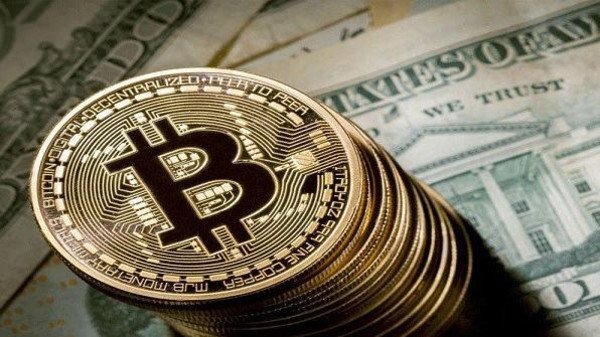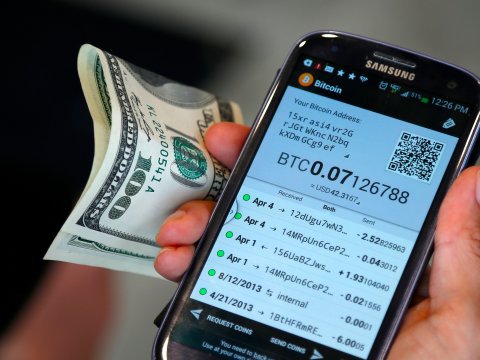Bitcoin Listen well .. Bitcoin is the money!

Now pretend that you are in the Davos forum sitting among the world's financial elite. A panel of eminent central bankers met face-to-face. Slowly you raise your hand to ask the million question: "Can any of you tell me what the Bitcoin is?" After a moment of stunned silence, the audience's voices squeaked. As the laughter gradually subsides, the "masters of the world of religion" will begin their usual discourse:
It's a fraud (Jimmy Damon), CEO of JPMorgan
I do not know ... but it will end badly (Warren Buffett), chairman of Berkshire Hathaway
It's a speculative bubble, just a Ponzi scheme for fraud, backed by nothing, it's nothing at all. (Ray Dalio) Founder of Bridgewater Associates
So, what is Bitcoin?
Position of regulators
On 8 January, the Israeli Bank of Israel was the last central bank to issue a press release in which it attempted to identify what the Pitcuin was or - better - what it was not.
"Betquin and other similar currencies are not currencies, they are not foreign currency, and they should be seen as financial assets."
For the State of New York, the Betquin is a "digital unit used as a medium of exchange or a form of digitally stored value".
Bitcoin, in the opinion of the German Federal Financial Supervisory Authority, is a "unit of account" and therefore a "financial instrument".
There were also more extensive identification attempts by the European Banking Association (EBA) and the Bank of Italy, which defined the Betquin as "a digital representation of a value not issued by a central bank or a public body, and not necessarily linked to a paper currency but used by individuals Natural and legal as means of commercial exchange, and can be transferred, stored and traded electronically. "
On the other hand, the Bank of Britain and the FCA have not taken a stand. Indeed, the power of conduct has gone so far as to state that it does not regulate digital currencies, while it does not intend to.

Money and currency in history
Let's see how cash history knows both currency and money. The money comes first.
Historically, there have been many forms of money, but given only in modern times, one can basically define two forms of money: money that stimulates commodities and paper currencies. Throughout history, gold and silver, the perfection of goods, were the purest forms of money. Because they have built-in value, while they can not be reduced. In the early 1900s, with the gold standard, commodity money became the "representative of commodity money" - especially as it was a reserve of digital currencies and recoverable to gold. But our current system relies instead only on paper currencies that have no intrinsic value and can not be redeemed and compensated - which the government recognizes as the legal currency within the state. Money should have some basic characteristics, such as to be
1 - a broker for commercial exchange 2 - unit of account 3 - and a store of value.
The money must also be replaceable, transformable, permanent and recognizable.
When money goes within an economic system and is accepted as a means of payment - in banknotes and coins - it becomes a currency as well. It is in this sense that "a generally accepted financial system is within the economic system". Thus you can own financially can be a flag at the same time, or money is not in currency. For example, funds - the best examples of gold and silver - have also been coins throughout history to Bretton Woods. Today, one can argue that it is no longer a currency, but it remains the purest form of money. However, to be more precise, some of the gold coins today are still legal currency in nominal value in the United States and are therefore still a currency. In 1912, when summoned to court to testify before the US Congress, JP Morgan said his famous words: "Gold is money, and everything else is credit."
On the other hand, you have the entire stock of the last four centuries - the Dutch Gould, the Spanish Rial and the British Pound - which were cash at the same time that I also served as a reserve currency, whose value collapsed to zero and no longer exists as a form of money.
Features Bitquin
Let us see how the Betcuene flows in this context:
As recognized by the European Banking Commission (EBA), Betquin owns the properties of money, such as being a unit of account or a means of trade. The only doubts are the storage of value and stability features, which are difficult to lend to Pitcone, as this digital currency is highly volatile. However, one can say that this same feature can hardly be attributed to any paper currency either, given our central bank's monetary reduction and monetary inflation policies. It is enough to deduce by looking at the US dollar-to-gold chart from 1970 to the present day to understand that the US dollar is not a storehouse of value. The volatility of the Betcairn is also due to its lack of liquidity and its small market, as well as the diminution of regulation and its young age. All these issues will be fixed over time.
The disposable petkinoene is removable, durable and recognized, like what money should be.
However, the betcons are not money goods or paper money. But the historical definition of money can not be sustained in the face of technological developments. It has become clear that the digital form of money is now recognized. However, if one accepts easily all forms of digital criticism, which are not derived from banknotes or commodities, like the Betquin, he must undoubtedly take another step. In fact, before the Pitcuin did not build any form of money just to "trust". Yes, the reason is that what is behind the Pitcuin is not a government or a commodity of intrinsic value. Betquin therefore relies on the confidence placed by users and miners, as well as consumers. For this reason, it is very important to analyze what "confidence" means here.
Trust money
We have two types of trust in money: substantive or substantive trust and self-confidence or spin-offs. The first is the type of trust that a person puts in the money of goods. So that one is confident that Mother Nature has made gold a rare and sufficient mineral to extract a limited supply of gold. One trusts his band here objectively. This kind of trust lies in precious minerals of nature. So you have confidence in paper money. It is subjective, accidental, which means that you have to trust groups of individuals or communities - governments and other authorities like central bankers - to act in a way that does not threaten government finances and paper currencies. The Bank of England, for example, shows that confidence in the pound sterling is rooted in measures to avoid fraud and low monetary inflation ... To put it simply, you trust that the government will not abuse the currency printing press - in short - it will be able to repay its debt and stay. If this type of "government-instilled confidence" only supports paper currencies, will people have more reasons to trust their governments (eg, paper currencies) or arithmetic algorithms (such as Betquin)? The question is by no means too small.
It is almost impossible to disprove that the form of substantive substantive trust greatly enhances self-sufficiency. The second type can only be classified according to its historical method. Unfortunately, the historical history of paper currencies is very bad. The answer again is Césaro's biography. Because history proves in the end that when people enjoy incentives - such as those that governments, politicians and economic elites have to create new currencies - they will always act accordingly. The result is that none of the paper currencies in history survived the inevitable degeneration and extinction phase. There will always be another Rosvette, another Nixon, more capital management for a long time, another Lehman, more bailout plans, more quantitative easing ... Let's not forget that this kind of self confidence can easily be lost. When that happened in history, The result was the collapse of past empires - or in modern times - of hyperinflation in Weimar, Argentina, Zimbabwe or Venezuela.
This is the fundamental reason why the arithmetic algorithm - which ensures non-effervescence and sparse spending, together with security and transparency in the general ledger - is considered to be intrinsically objective, while states and their paper currencies are not. This is a great argument for Betquin.
If one agrees on this key issue of trust, if digital money like petquin would not be money, it would also outperform any paper currency as well. Even the Goldman Sachs financial institution has recently changed its mind and now agrees that the Betquin is real money.
Not yet a coin
If the Bitcoin are undoubtedly money, can they be considered currency as well? Not yet. But it may be a currency in the future, depending on the evolution of the Bitcoin to a generally accepted financial system in the global economic system. For example, ETH is not just a form of money, but it is, for all purposes, the currency of the day. This is due to the fact that it is undoubtedly a generally accepted financial payment system in the ethereum community. Therefore, it performs my money (digital) and currency (special) function. However, unlike the ETH in the ethereum community, bitcoin does not function as a "useful" function in a closed system, and for this reason it should be used more widely in the global economy before it is considered a "universal" currency.
hola! I like your post! Thanks for it! I went to jail because of cryptos... lets make steemit together to a better place with our content! I would like to read a bit more about you and maybe do you have some more pictures? I also just wrote a introduce yourself. Maybe you upvote me and follow me swell as I do? https://busy.org/introduceyourself/@mykarma/1-jail-review-bitcoins-3-years-ago
What's with cryptos that put you in jail?
Read it